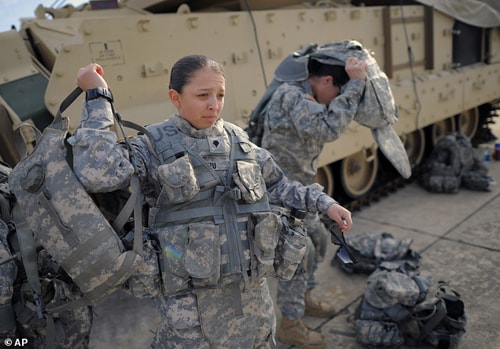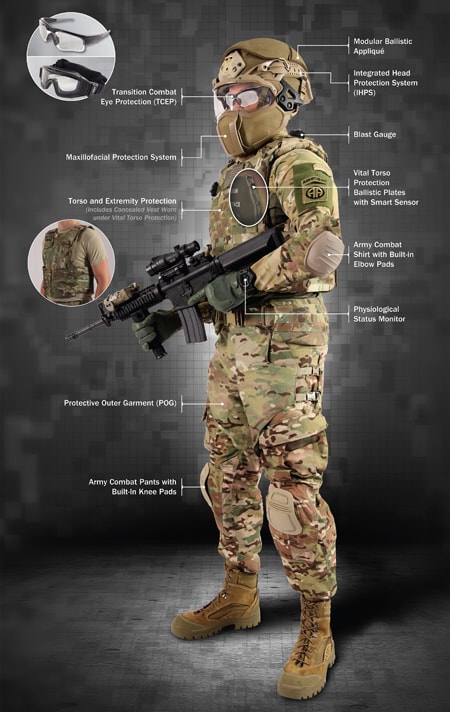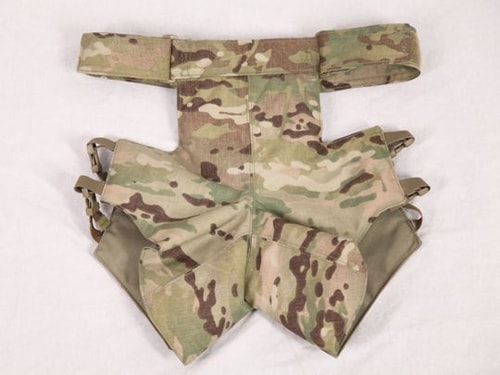Armor exclusively for female soldiers of the US army
The Pentagon has listened to female soldiers to design new body armor that better fits their curves and protects their reproductive organs.
 |
Female US soldiers in body armor prepare to join a patrol. Photo: AP |
While the world is celebrating International Women's Day on March 8, the US military has also made the first moves to better protect female soldiers serving in the country's armed forces, especially in the context of women being allowed to perform combat missions in all branches of the military, according to Vice.
In January, US Defense Secretary Ash Carter announced the start of a new protection program that would see male and female soldiers have their sperm and eggs frozen before they are deployed. The Pentagon is also considering a less complicated option: body armor that would better protect soldiers’ reproductive organs, especially women, without restricting their mobility.
For nearly 10 years, all the body armor provided to female soldiers serving in Afghanistan and Iraq has been designed to male standards. This has led to the fact that the protective armor does not fit the curves of the female soldiers' bodies, forcing them to move equipment that is usually worn on the hips to the shoulders to not be hindered when moving. Their reproductive organs are also not well protected because the armor is designed specifically for men.
“My entire lower body was virtually unprotected,” said Staff Sergeant Elana Duffy, who served in the Army from 2003 to 2013 in intelligence. While she was not in a direct combat position, her job required her to frequently go to the front lines to interrogate insurgents. “If the suit was actually designed to protect my reproductive organs, I would have been nearly unable to bend over.”
According to Pentagon figures, more than 53,000 US soldiers were injured by explosives on the battlefields of Iraq and Afghanistan, many of whom suffered genital injuries, leaving them infertile upon discharge and requiring artificial insemination to have children.
"Our armor at that time was designed to be bulletproof, not blastproof," Duffy said.
After hearing complaints from soldiers, the Pentagon ordered a new design, with a genital armor consisting of bulletproof Kevlar shorts and two Kevlar panels covering the outside. But the armor was so cumbersome and uncomfortable that soldiers refused to wear it in combat.
In interviews, American soldiers said that the armor was not convenient for them to move, and that commanding officers did not force them to wear the armor before combat, as a result, many soldiers had never known about the lower body protection that engineers had painstakingly designed.
Congresswoman Niki Tsongas has warned of the inconveniences and dangers that female soldiers face when wearing armor designed for men. "One of the most alarming things is that when wearing these large armors, women can hardly lift their arms properly to fire their guns. This will be a danger when female soldiers participate in direct combat missions on the battlefield."
Armor for women
Taking into account soldiers' feedback on the suit's comfort level, the Pentagon is testing the effectiveness of a new protection system, which includes a pair of Kevlar-fiber shorts that provide extra protection for the abdomen, thighs, buttocks and genitals.
 |
Protective equipment on female US soldiers in the future. Photo:PEO Soldier |
US defense officials said that the results of testing the new armor at Fort Lewis, outside Tacoma, Washington, showed that soldiers highly appreciated the performance and comfort of this new armor. However, before it is widely used in the military, the new armor will have to undergo another testing process, at least until 2019.
“Sometimes change is too slow, especially in areas like protective armor for soldiers,” complained Congresswoman Tammy Duckworth, a former US Air Force pilot and the first female soldier to have both legs amputated after her helicopter was hit by gunfire in 2014. “Bureaucracy means useful things take a long time to reach soldiers on the battlefield.”
However, thousands of new improved armor have also been distributed to female recruits in the US Army, Marine Corps and Special Forces under orders from Secretary Carter late last year. These female soldiers will go into battle with the new armor in the second half of this year, after completing the training program, according to Stripes.
The new armor also comes in six new, smaller sizes to accommodate women's body sizes and curves, said General Michael Williamson, the Army's chief of acquisition, logistics and technology.
"Anyone who has worn body armor knows that if the size doesn't fit properly, you can't move comfortably. We've worked hard to get body armor that provides excellent protection for the abdomen and reproductive organs in sizes that are suitable for both men and women," said Williamson.
The difference in the armor for female soldiers is not just in size. Engineers redesigned the armor based on studies of female anatomy, to ensure it would accommodate their different body proportions.
 |
Kevlar shorts provide good protection for female soldiers' reproductive organs. Photo: PEO Soldier |
Meanwhile, the Marine Corps also received 3,800 new armor sets, including the smallest ones designed for female soldiers for the first time.
Protective gear isn’t the only thing the Department of Defense needs to improve as it looks to expand the role of women in combat roles. According to Congressman Tsongas, combat boots could be next.
"We know that the military is distributing combat boots to both male and female soldiers without much consideration for what women's feet need depending on the requirements of their missions," the congresswoman stressed.
According to VNE
| RELATED NEWS |
|---|


